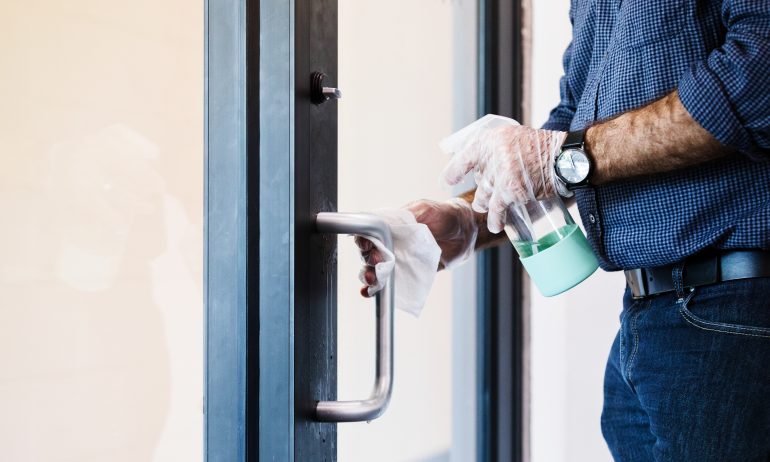Business Grants for People Previously Convicted of Felonies

Many or all of the products featured here are from our partners who compensate us. This influences which products we write about and where and how the product appears on a page. However, this does not influence our evaluations. Our opinions are our own. Here is a list of our partners and here's how we make money.
As many as one in three Americans have criminal records. And since most employers run background checks on potential candidates, these records can be a considerable impediment for those previously convicted of a felony.
In fact, according to the Sentencing Project, more than 60% of formerly incarcerated individuals are unemployed one year after being released.
Therefore, starting and running a business may be a suitable way of earning income. Although formerly incarcerated individuals can still face challenges as entrepreneurs, a variety of small-business grants and additional resources can help.
How much do you need?
We’ll start with a brief questionnaire to better understand the unique needs of your business.
Once we uncover your personalized matches, our team will consult you on the process moving forward.
Grants for people previously convicted of a felony
Unlike small-business loans, grants provide free funding that doesn’t need to be repaid. Grants can be a particularly good option for formerly incarcerated entrepreneurs who don’t want to take on debt or have trouble qualifying for debt financing.
It’s important to keep in mind that finding and applying for small-business grants is time-consuming and entries are competitive. If you dedicate the necessary time and effort, however, you may be able to access free capital for your business.
Nonprofit and corporate grants
Formerly incarcerated individuals can get business grants from corporations and nonprofit organizations. Some nonprofits even offer second-chance entrepreneurial programs — in other words, training and funding opportunities designed specifically for previously incarcerated people.
Rise Up, Get Started Grant Program
Determination, Incorporated, a nonprofit organization based in Kansas City, Missouri, that helps formerly incarcerated individuals start and grow their own businesses.
Through the organization’s Rise Up, Get Started initiative, business owners can participate in a year-long program where they receive coaching, mentoring and community support. Entrepreneurs will also have assistance writing a business plan and creating a budget.
At the conclusion of the program, participants will have $300 saved for their business — and Determination, Incorporation will award a $750 grant on top of these savings.
The nonprofit organization also runs an in-prison Back to Business workshop, which helps incarcerated individuals develop a business plan so that they can get started quickly upon release.
Georgetown Pivot Program
The Georgetown Pivot Program is a full-time, one-year program designed to help formerly incarcerated individuals develop the skills to succeed in a business and professional environment.
Over the course of the program, participants will attend classes, receive an internship placement and get the opportunity to develop their own business idea. Each participant will present their business idea at the Pivot Pitch Competition for a chance to win startup funding. In 2022, participants were awarded a total of $15,000 in grant money.
To qualify, participants must be 25 years or older with a high school or a GED diploma who were last incarcerated within the past five years. Preference is given to Washington, D.C., residents.
The Transform Business Grant
The Transform Business Grant is open to business owners in systemically oppressed groups, including formerly incarcerated people. In addition to $1,000 microgrant, recipients will also be awarded a customized, year-long business strategy and development program. The 2024 grant cycles will be announced in February.
LEAP Virtual Entrepreneurial Academy
LEAP is a nonprofit organization based in Florida that works with previously incarcerated women and helps them as they transition back into society. The LEAP Virtual Entrepreneurial Academy is a program that runs twice per year and teaches business skills to its participants.
Over a three-month period, students attend classes twice per week, and at the conclusion of the program, they pitch a business plan to a panel of entrepreneurs for an opportunity to win cash prizes. Graduates are also eligible to apply for a $1,000 microloan.
To qualify, you must be a formerly incarcerated woman who has access to a computer. LEAP covers all program costs through funding from its sponsors.
Amber Grant
Although not designated exclusively for previously incarcerated individuals, the Amber Grant is another great funding option for women entrepreneurs. The nonprofit organization WomensNet offers several grant opportunities to businesses that are at least 50% women-owned, including the $10,000 monthly Amber Grant and the $25,000 annual Amber Grant.
WomensNet also issues a startup-dedicated grant, a nonprofit-dedicated grant and business category grants. Each month, the organization offers a $10,000 grant to a company in a specific industry — in January, for example, the funding is awarded to an skilled trades business.
You can apply for all of these grants by submitting one simple application through the Amber Grant website.
NASE Growth Grant
The National Association for the Self-Employed (NASE), provides growth grants of up to $4,000 to small businesses on a quarterly basis. To be eligible for one of these grants, however, you must be a NASE member.
The organization offers several different membership options (which include additional benefits, such as expert advice and product discounts) and does not exclude formerly incarcerated individuals from joining.
Once you become a member, you can apply for a grant through the NASE website. Monthly members, however, will have to wait 90 days before they can apply. For the application, you’ll need to provide a business plan and explain why you need the funds and how you’ll use the money.
Bizee's Fresh Start Business Grant
If you’re just starting your entrepreneurial journey, the Bizee Fresh Start Business Grant (formerly the Incfile Fresh Start Business Grant) can help you legally register your business, as well as cover startup costs.
Grant winners will receive Bizee’s Gold plan for free, which includes incorporation services in your state, free registered agent services for a year and a free tax consultation. You’ll also receive a $2,500 grant.
To apply, you must complete an online application, create a two-minute video explaining how entrepreneurship will impact your life and submit a sample business plan.
Government grants
Individuals previously convicted of a felony can also get business grants from the federal government, as well as state and local governments. Here are some options to consider:
Grants.gov
Grants.gov is a database of federal small-business grants available to all types of entrepreneurs, including formerly incarcerated individuals. This database offers access to over 1,000 grants administered by 26 government agencies, such as the Department of Energy, Department of State and Department of Transportation.
To apply, you’ll need to register your business using the System Award Management platform and get a unique entity identification number. Once you have your number, you can create an account on Grants.gov to submit your grant applications.
Economic Development Offices
Most states and many cities have economic development offices, which are dedicated to promoting and supporting local businesses. Through your regional office, you’ll likely be able to find information regarding government funding solutions, training programs and tax incentives.
Maine’s Office of Business Development, for example, provides a variety of grant opportunities, including options that finance recreation businesses, local tourism, agriculture and food businesses, among others.
Additional resources for people previously convicted of a felony
Entrepreneurial training programs and other tools can be extremely beneficial for individuals previously convicted of a felony looking to start or grow their businesses — even if they don’t necessarily provide free funding. Finding organizations that focus on helping the formerly incarcerated transition back into society through entrepreneurship can be particularly useful.
Here are some available resources:
Help For Felons
The website HelpForFelons.org provides a wide variety of resources for those who were convicted of felonies, as well as other previously incarcerated individuals. Through the site, you can find job postings, legal information and housing options. You can also access lists of personal and business grants, loans and other forms of financial assistance.
Inmates to Entrepreneurs
Inmates to Entrepreneurs is a nonprofit organization whose mission is to help people with criminal backgrounds launch their own businesses. The organization offers free online and in-person courses to give would-be entrepreneurs the business education they need to get started.
Defy Ventures
Defy Ventures administers several second-chance programs with the goal of helping formerly incarcerated individuals succeed in their new lives and decrease the rate of recidivism. Through Defy Ventures, potential entrepreneurs can participate in an entrepreneur boot camp or a business accelerator. Through these programs, they gain the skills they need to launch and grow a business.
Project ReMADE
Project Remade is an entrepreneurship training program run by Stanford Law School. This program teaches formerly incarcerated individuals basic business skills and introduces them to professionals in the business community.
Between classes, students meet with mentor teams who help them develop a potential business plan. Mentor teams consist of one Stanford Law Student, one Stanford Graduate School of Business student and one Silicon Valley professional.
At the conclusion of the program, entrepreneurs present their business plans before a panel of executives and microdevelopment organizations.
Entre Capital
For entrepreneurs who are still looking for financing, Entre Capital is a community development financial institution (CDFI), specifically devoted to providing capital to second-chance businesses. The organization only funds previously incarcerated individuals, offering them loans to start or expand their operations.
Entre Capital also offers assistance with business planning, budgeting and financial reporting, as well as mentorship resources.
Refoundry
Refoundry is an incubator program based in Brooklyn, New York. Through this program, formerly incarcerated individuals are taught to repurpose reclaimed materials into home furnishings. As they develop these skills, Refoundry mentors also teach participants how to build a resume, succeed in an interview and start their own business.
Small Business Development Centers
Small Business Development Centers (SBDCs) are SBA-sponsored centers that provide free or low-cost training and assistance to new and existing businesses. These centers are typically hosted by local colleges or universities, as well as state economic development agencies. SBDCs often maintain lists of funding opportunities in your area and can help you find and apply for the best options for your needs.
On a similar note...


